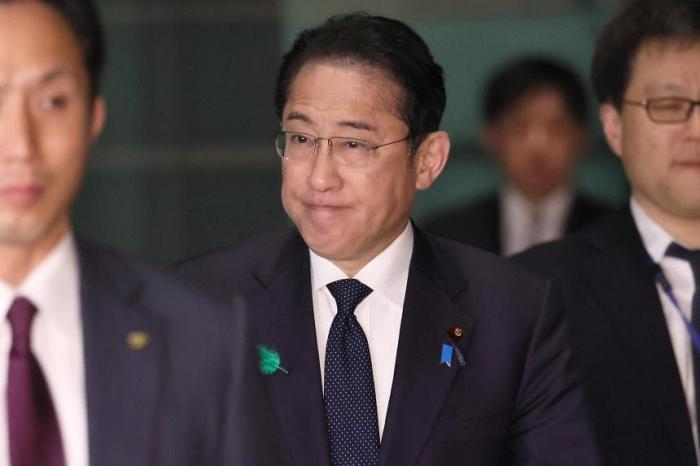«Black Swan» for the ruling Liberal Democratic Party of Japan

The by-elections of deputies to the main lower house of parliament in Japan to replace members who retired from it took place in the electoral districts of three prefectures — Nagasaki, Shimane and the capital Tokyo. As a result, candidates from the opposition Constitutional Democratic Party (CDP) won parliamentary seats in all three prefectures with a significant advantage. And this despite the fact that previously LDP politicians invariably won in these districts. And Shimane Prefecture was considered a traditional fiefdom and stronghold of conservatives.
Let us say right away that such unprecedented success cannot be attributed to the rapid growth in popularity of the CDP and its policies. For this was a protest vote against the liberal democrats, who, we are not afraid to say, have ruined their image with a series of corruption scandals that were quite disgusting in the eyes of the people, engulfing the entire top of the party and government and many deputies from the LDP. The newspaper of the Communist Party of Japan, Akahata, exposed a quarter-century scheme for collecting money from the country’s entrepreneurs in the form of “tickets” imposed on them for “evenings” organized in luxury hotels by factions within the LDP, called habatsu. Then this money was secretly transferred by a prominent LDP deputy supposedly for “political activities” with a recommendation, in circumvention of the law, not to declare it to the tax service. At the same time, faction members received unaccountable amounts of tens of millions of yen. In Japan, this is called «datsuzei» — tax evasion, which is a serious crime and is strictly punished by law.
Massive prosecutorial checks and interrogations of unscrupulous deputies were carried out, but criminal cases were initiated only against a few deputies, who were forced to leave the deputy seats they had occupied for years and pay symbolic fines for their income.
Having been studying the political world of Japan for more than half a century, communicating closely with representatives of its parliamentary corps, I witnessed many corruption scandals that sometimes excited the entire Land of the Rising Sun. But with certain reputational losses, using the support of big capital and right-wing forces, the LDP came out, so to speak, unscathed, continuing to hold the reins of power.
However, now this party has been visited by a real “black swan”. As you know, this term defines critical events that cannot be predicted, but which can radically change the course of events and even history. The term is based on an ancient saying that suggested that black swans did not exist.
So we have something similar in Japan at the moment. As a result of a huge scandal and indignation of almost the entire Japanese society, political power in the country may change, and the LDP, having collapsed, may completely leave the stage as a political party. Already, 42% of Japanese are in favor of this. Those who prefer not to change anything and leave the LDP in power – 32%. However, this ratio may change even further in favor of those who favor change.
Today, the decline in the authority of the ruling party and its cabinet is clearly evident in public opinion polls. Only 16 to 20% now support the Kishida government, and only a quarter of the Japanese population supports the LDP. At the same time, both of them, however, for various reasons, are already loudly demanding Kishida’s resignation and the immediate holding of early general elections to parliament in order to pronounce the people’s verdict on the “servants of the people” who have tarnished the parliamentary honor. However, Kishida and his entourage stubbornly refuse to resign and hold elections, because they understand that the LDP will not be able to win a popular plebiscite and the party may not receive the majority necessary to form a government in the lower house. According to the Constitution, the next elections to this chamber should be held only next year.
Kishida himself wants to remain in the prime minister’s chair until September of this year so that, despite the responsibility for bringing the party to a critical situation, he can again nominate himself as chairman of the LDP for a position that, with a majority in parliament, automatically guarantees the post of prime minister. However, the results of the past elections may bury these plans and calculations of Kishida.
“Failure to secure victory in Shimane could undermine Kishida’s political base and push LDP lawmakers to try to oust him from power before the next general election, making it unlikely that he will enter the party’s presidential race in September,” the country’s leading news agency, Kyodo, has already conceded. tsushin.»
The discouraged leadership of the LDP has no choice but to repeat the daily mantra promise to “work to restore the trust of voters.” “We take these harsh results seriously and will work to restore trust while making efforts to reform and solve problems,” NHK quoted LDP Secretary General Toshimitsu Motegi as saying.
And for the first time in history, Akiko Kamei, a protege of the opposition Constitutional Democratic Party, who won the election against an LDP candidate in the “conservative fiefdom”, said her victory in Shimane sends a “serious signal” to Kishida, who has been criticized by the people for his failure to take effective measures to increase wages exceeding the sharp rise in prices. And we should agree with this, because the corruption scandal became only a catalyst for an additional surge of dissatisfaction among the Japanese people with the existing government. At the same time, the Japanese are protesting not only against the domestic policy of the Kishida cabinet, which does not take into account the interests of the people, but also against the foreign policy course of the LDP.
After returning from Washington , where the Japanese prime minister announced the transformation of the Japanese-American military alliance from regional to global, opposition forces accused Kishida of agreeing to subordinate the Japanese armed forces to American command. Thanks to the fact that in the Land of the Rising Sun, at the request of the people, parliamentary debates are broadcast live on television, one can personally observe the often clumsy and evasive answers of the prime minister and his cabinet ministers to pressing questions from deputies of opposition parties on pressing issues of the political and economic course of the ruling Liberal Democratic Party parties.
This happened in connection with the actual subordination of the Japanese “self-defense forces” to the Pentagon, for which a special military headquarters will be created in Tokyo, coordinating close interaction between the armies, navies and aviation of the two countries. Trying to justify himself, Kishida stated that he, as the commander-in-chief of the Japanese armed forces, would retain command of them. Although it is obvious that the leadership of the new headquarters will certainly be American generals. And the Japanese prime minister will, at best, only formally sanction the operational decisions and orders of the American command. In reality, the plans of Washington and the Pentagon include the inclusion of Japanese armed forces in the American grouping in the Asia-Pacific theater of operations. So the ambitions of Kishida, who sees himself as an independent commander-in-chief, can be left only for parades of the “self-defense forces” in peacetime. During the period of joint military operations by the armed forces of the United States and Japan, the role of the civilian Japanese prime minister will be minimal.
Realizing this, the Japanese openly protest against the plans of the government and the ruling LDP, contrary to the will of the people, to drag them into dangerous armed conflicts, and even into a big war.
The country’s leading newspaper, Asahi Shimbun, writes that the authorities will not advertise the transfer of the “self-defense forces” to American command, but will present the matter as if the Japanese armed forces “are under the supervision (?!), and not under the command” of the United States. According to the author of the Asahi article, official Tokyo may take an even more absurd position, arguing that “being under command does not mean that someone is commanding you.”
When preparing his visit to Washington, Kishida hoped that his “performance” in the White House and speech in the US Congress would add political points to him at home and increase his rating of trust and support. But even here the unlucky politician miscalculated — the news that the Japanese leader was tying his country even more tightly to the American military machine, creating a real danger of Japan being drawn into a big war with its neighbors, turned the Japanese away from him even more. During Kishida’s days in the US, his rating dropped to an obscenely low level of 16.6%.
Seeing the failures of the current government in all areas of policy, big capital, which is the “deep state” of Japan, after the crushing failure of the LDP and Kishida personally in the elections, will apparently come to the decision to get rid of the unpopular and indignant politician. So, in our opinion, “Kishida oroshi” — “throwing Kishida overboard” — is a near future…
https://www.fondsk.ru/news/2024/04/28/yaponcy-otkazyvayut-v-doverii-partii-denezhnogo-meshka.html
